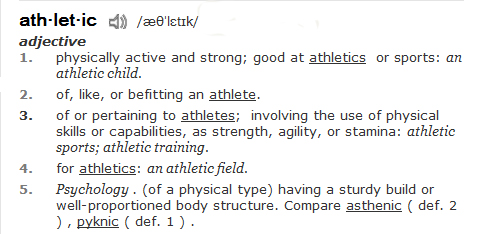 It’s hard to get more than 60 seconds into a sports broadcast these days without hearing the announcer praise a player’s “athleticism.” Sometimes it’s a whole team that gets the praise. But I’m not sure exactly what it is that’s being praised.
It’s hard to get more than 60 seconds into a sports broadcast these days without hearing the announcer praise a player’s “athleticism.” Sometimes it’s a whole team that gets the praise. But I’m not sure exactly what it is that’s being praised.
It is, after all, a game—a competition between professional athletes. And these athletes are major-leaguers, many of them multimillionaires because of their physical prowess, individuals whose skills have been honed for at least years, in many cases for decades, and increasingly, for their entire lives. And the announcers are praising them for their athleticism?
Duuuuhhhhhh!
It is not worthy of comment that a professional athlete displays athleticism. It would be worthy of comment if an athlete did not display at least some components of the skill—fleetness of foot, agility, endurance, or an extreme form of coordinated movement that allowed him or her to compete and often to succeed.
I don’t mean this to dump on sports announcers, who have the difficult task of filling the often lengthy gaps between the individual sports events that make up a game. But I do think they’ve seized upon a particular word in this case that is a given and not an astute observation. I’m more than a little surprised that the use of athleticism seems to be increasing.
The word itself is a mouthful—five highly Latinate syllables—that is the noun form of an almost academic term. Athletics is used to describe an endeavor when the user is trying to pump up the importance or meaning of the much simpler monosyllabic sports.
But athleticism is a more economical term than the best-known usage that preceded it: athletic ability. That cluster has seven syllables. It’s slightly less haughty. But in the trade-off between comfort and compression, athleticism has been winning.
I tend to come down on the side of the component parts of the concept as the best description of an athletic ability. Is it agility that being praised, a particular ability to move gracefully and effectively? Is it strength, the sheer power of the play? Or is it endurance, the ability to go on doing something long after the competitors have become exhausted? Each of those is a more precise and more compact description of the skill being praised.
It’s no secret to me why the Olympics chose as its slogan the Latin phrase for “faster, higher, stronger.” They’re words so sharp, so strong, so powerful that you can almost feel what they describe. Notice that athleticism isn’t among them.


